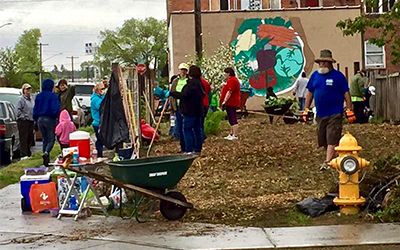 | What Neighbors Can DoA good neighborhood doesn’t just happen.It takes stewardship and a desire to form relationships to keep people on good terms and the neighborhood safe for families and kids. As a neighbor, you may not know the people next door or across the street as well as you might like, but your proximity to them makes you one of the closest people available when help is needed. Part of creating a good neighborhood—and a safe one—is getting to know the people living near you and looking out for one another. Fortunately, there are many things that you can do to support parents and promote a safe neighborhood for children. |

Listen and Connect
Being surrounded by a positive community group can help children and families develop strong, nurturing relationships. This is important because having positive relationships helps counterbalance the negative effects on the brain and development that occur when a child experiences toxic stress caused by neglect or abuse. In turn, this increases the likelihood that children will be able to achieve their potential and become productive citizens. Here are some ways you can contribute to positive community groups and develop relationships in your community.
- How many families do you know on your block? Getting to know your neighbors is a good place to start—meeting others increases a sense of connectedness for everyone.
- Mentor a child in your neighborhood, help with schoolwork or teach a skill. These relationships are invaluable to children.

Help
No single action makes a person a good neighbor—it’s a series of actions, big and small, that build a stable network between individuals and families in a given area. Here are examples of what you can do to build your neighborhood community.
- Pay attention to what’s happening in your neighborhood and look out for your neighbors. If you’re concerned about a neighbor because you haven’t seen them recently, stop by to see if they’re OK.
- Run an errand, shovel snow, or do yardwork for a busy parent or elderly or disabled individual in your neighborhood.
- Offer to fill in for a friend or neighbor if they can’t attend a child’s sports event or school play.
- Ask a neighbor if they need something picked up the next time you run to the store.
- Invite a neighbor family over for dinner.
- Be a “model” neighbor for kids on your street by demonstrating neighborly behavior. Greet neighbors and offer to help out when you can.
- Parenting is often difficult and asking for help can be hard. Showing support for a parent you know can be as straightforward as offering a sympathetic ear and a helping hand.
- Establish a relationship with the parents and children living near you and let them know you are there for them. Once you know a family, offer to babysit so that parents can enjoy a night off.
- Create opportunities to get to know your neighbors. Organize a neighborhood block party. Hand out flyers or use door hangers to invite families you don’t know.
- Find ways to support families in need living near you. Coordinate a meal sign-up calendar for new parents or a neighborhood family in need or offer to babysit older children. Donate children’s used clothing, furniture and toys.

Participate
There are many organizations in the community that need support or community participation. Here are a few examples:
- Join your neighborhood council—every neighborhood has one. Find yours here.
- If you enjoy walking your dog (or other pet), participate in a neighborhood watch with your pet by joining the COPS Paws on Patrol program.
- Support community events in your neighborhood. Attend local craft and community fairs, park concerts and kids’ athletic events. This gives you a chance to meet others while supporting positive activities in your community.
- Start or participate in a neighborhood carpool.
- If you live in Northeast Spokane, join the Zone Project, a community initiative designed to address opportunity gaps and empower children, youth and families in Northeast Spokane.

Educate and Share
Share resources with neighboring families who may need assistance—here are some options:
- Parenthelp123 has parenting and child development information.
- Nurse Family Partnership (NFP) connects pregnant women with their own home visiting nurse.
- WIC is a nutrition program for women, infants and children from birth to 5 years old.
- Vanessa Behanprovides a safe place with trained, caring staff for parents to leave their children during times of crisis.
- Children’s Home Society provides family and child counseling.

Advocate
There are many ways that you can help advocate for the well-being of children and families, but here are some examples:
- Encourage your local school to adopt a social emotional learning curriculum and trauma-informed practices.
- Attend trainings and activities offered by Our kids: Our business, Spokane’s coalition of child advocates.
- Check out advocacy resources, such as MomsRising, or the Children’s Alliance for information about ways to support access to things all families need to be resilient and healthy, like safe and affordable childcare for all, consistent work scheduling, leave benefits for all employees or livable wages.
- If you haven’t already, visit the County Elections office in-person or online to register to vote, check your voting status, or update your address.

Learn
Learn how to support a survivor of abuse, neglect or domestic violence by checking out the resources at Lutheran Community Services.
If you believe domestic violence is occurring at a neighbor’s residence, you can find resources at YWCA or The National Domestic Violence Hotline at 1.800.799.7233.
